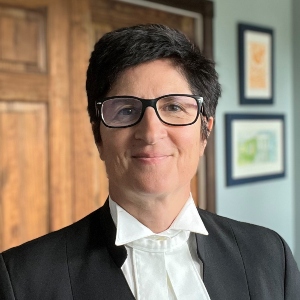The Honourable Susan Wishart
 WHAT WAS YOUR PATH INTO LAW AND ONTO THE BENCH?
WHAT WAS YOUR PATH INTO LAW AND ONTO THE BENCH?
I grew up in the small town of Belleville Ontario and as a young person I never thought about being a lawyer. I wish I could say that I was inspired to be a lawyer after reading the book “To Kill a Mockingbird” in high school, still one of my favourite books, but my path into law was a more practical one. I studied sciences in university and near the completion of a Masters of Science degree I felt my career options were fairly narrow so I applied to law school. I chose the University of Victoria because of its co-op program and I loaded up my Mazda GLC and drove west. Although I knew nothing about law when I arrived in Victoria my experience with scientific research and writing proved useful.
Over the course of completing my law degree I did not have a plan in terms of what type of law I wanted to practise, but I was certain that I did not want to work at a big firm. Sometimes knowing what you don’t want to do can be just as helpful. Through a series of opportunities early in my legal career I ended up practising criminal defence law in Victoria and I loved every minute of it. Helping people navigate the criminal justice system was very rewarding work. I was in court almost every day and although I conducted lengthy cases in BC Supreme Court, most of my time was in Provincial Court. This is where the seed was planted that being a judge was a potential career path.
While I waited my turn in busy courtrooms I had a lot of time to observe judges at work. I was particularly influenced by those judges who were unfailingly kind, compassionate and patient. I gained further insight into the work of being a judge through my involvement with the CBA. As Chair of the CBABC criminal section in Victoria I worked on committees with judges on criminal rules reform. After being a lawyer for 12 years I applied to the bench in 2007 and was appointed in 2009. At the time of my appointment I was one of only a few women practising criminal defence law in Victoria. In 2016 I was appointed an Associate Chief Judge of the Provincial Court of BC.
WHAT EXPERIENCE IN YOUR LEGAL CAREER BEST PREPARED YOU FOR WORK ON THE BENCH?
Two experiences best prepared me for work on the bench. The first was spending a lot of time in court and experience with the pace of work in provincial court. This required quickly absorbing and analyzing information, particularly when representing clients on bail hearings. These skills are crucial for a provincial court judge presiding in busy courts where decisions need to be made immediately. The second experience that best prepared me for work on the bench is what I learned from my clients. As a criminal defence lawyer I worked with clients from diverse backgrounds: cultural, social, economic and health. Many of my clients had substance use or mental health issues, suffered childhood trauma, and struggled with poverty-related issues. I witnessed the impact this had on them and how these underlying issues were the root cause of their involvement with the criminal justice system. I see these same issues every day in court as a judge and my experience as defence counsel helps me to see “the person” in everyone who appears before me in court.
WHAT ADVICE TO YOU HAVE FOR COUNSEL WHO APPEAR BEFORE YOU?
Embrace technology in the courtroom as it is here to stay. Counsel need to be proficient at using technology for virtual court appearances and be able to thrive in a paperless court system. The pandemic necessitated long-overdue changes to the justice system in terms of technology. I see some counsel struggling to adapt to these changes and encourage lawyers to take advantage of training opportunities.